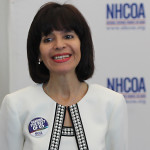The AID Institute’s 7th annual National HIV/AIDS and Aging Awareness Day (NHAAAD) will be observed September 18, 2014 with the theme “Aging is a part of life; HIV doesn’t have to be!” For more information about HIV/AIDS and older Americans or to become involved with the campaign, visit www.NHAAAD.org.
Among diverse communities, the stigma of HIV is a cause of shame, embarrassment, and worse of all, denial and silence. When denial and silence are present, the lack of communication and information lead to myths and misinformation. Worst of all, silence results in increased infections and is inevitably compounded by stigma, which leads to people living with HIV who are undiagnosed and therefore, untreated.
In the U.S. alone, 1 out of 6 persons is unaware s/he is HIV positive. The reality is that older Americans are just at risk of HIV infection as younger age groups are.
[Learn more HIV statistics in the United States]
In fact, adults 55 years and older represented nearly one-fifth of the U.S. population living with HIV in 2010. The CDC estimates that by next year (2015), this number will double, which means that half of the people living with HIV in this country will be 50 years and older. There are several reasons why older Americans who are HIV+ may not be aware of their status:
- HIV tests aren’t always included as part of the check up routine, and seniors tend to think they don’t know need to ask for one;
- The signs of HIV/AIDS can be mistaken for the aches and pains of normal aging;
- Older adults are less likely to discuss their sex lives or drug use with loved ones or a health care provider;
- Myths and misinformation that lead seniors to believe that they are “too old” to get infected;
- Lack of targeted public education*.
However, we should not only be concerned with reducing HIV infections among the older adult population.
Medical advances have allowed people with HIV who get treated— and stay in treatment— to lead longer, healthier lives. Yet, the success of these new treatments and the increased longevity of patients have led to new challenges to the proper prevention and care of older Americans living with HIV, especially those who are from diverse communities. There is a lack of research aimed at aging with HIV, as well as few prevention campaigns, clinical guidelines, demonstration projects and training initiatives targeting older adults living with HIV, particularly diverse seniors. While the Affordable Care Act does include provisions to support people living with HIV/AIDS, including older Americans, the public policy landscape is scarce when it comes to seniors and HIV/AIDS.
[Related content: Learn how the ACA is helping older Americans living with HIV.]
Older Americans with HIV are often excluded from major legislation, policy initiatives and programs— from the White House Conference on Aging, to the Older Americans Act and the Ryan White CARE Act, to the Medicaid expansion, and more.
Left unaddressed, generations of older adults with HIV/AIDS will lack the supports they need to age with dignity and in the best health possible. This is why the Diverse Elders Coalition in collaboration with ACRIA (AIDS Community Research Initiative of America) released 8 recommendations that have the potential of dramatically improving the lives of diverse seniors, and all older Americans, living with HIV.
What you can do on National HIV/AIDS and Aging Awareness Day
- Start a conversation at home, or with a loved one, on HIV/AIDS.
- If you are sexually active, ask your healthcare provider for an HIV test during annual check ups.
- Read the Diverse Elders Coalition’s Eight Policy Recommendations for Improving the Health and Wellness of Older Adults with HIV.
- Join the conversation on Facebook and Twitter with the hashtags #AIDSandAging and #NHAAAD.
- Share this blog post with your contacts and raise awareness about HIV and aging.
* To combat this, NHCOA is a partner of the CDC’s Act Against AIDS Leadership Initiative, which is focused on reducing the incidence of HIV/AIDS among diverse communities. Through culturally and linguistically appropriate, and age sensitive outreach and education, NHCOA conducts HIV outreach and education among Hispanic older adults and families to dissipate the stigma and silence.
Additional Resources
www.aoa.gov/AoARoot/AoA_Programs/HPW/HIV_AIDS
Posted by Maria Eugenia Hernandez-Lane, Vice President of the National Hispanic Council on Aging (NHCOA). The opinions expressed in this article are those of the author and do not necessarily reflect those of the Diverse Elders Coalition.


